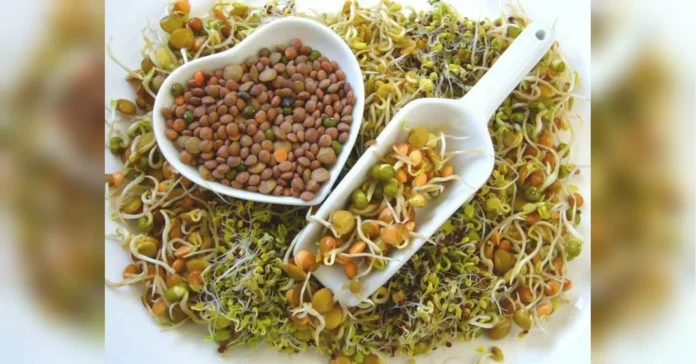Sprouts are a popular and nutritious addition to any diet. These tiny, young plants are packed with vitamins, minerals, and antioxidants, making them a great choice for anyone looking to boost their health. But did you know that the size of the sprout can also affect its taste and texture? In this article, we will explore the benefits of consuming sprouts at different stages of growth, as explained by Natalia Zemnaya, a nutritionist and health expert.
According to Zemnaya, sprouts that are less than 2 mm in size are best consumed together with the grain they come from. This is because at this stage, the sprout is still attached to the grain and has not yet fully developed its own flavor. By consuming them together, you can enjoy the benefits of both the grain and the sprout.
But what about larger sprouts? Zemnaya recommends allowing them to grow to 5-7 cm in length before consuming them. At this stage, the sprout has developed its own distinct flavor and texture, making it a delicious addition to any dish. Plus, the longer the sprout grows, the more nutrients it absorbs from the soil, making it even more nutritious for you.
One of the main benefits of consuming sprouts is their high nutrient content. They are a rich source of vitamins A, C, and K, as well as minerals like iron, magnesium, and calcium. They also contain antioxidants, which help protect our cells from damage caused by free radicals. By consuming sprouts, you can boost your immune system, improve your digestion, and even lower your risk of chronic diseases.
But that’s not all – sprouts also have a high protein content, making them a great choice for vegetarians and vegans. They are also low in calories and fat, making them a perfect addition to any weight loss diet. Plus, they are easy to digest, making them a great option for those with sensitive stomachs.
One of the most exciting things about sprouts is that you can easily grow them at home. All you need is a jar, some water, and a few days. Simply soak the grains in water for a few hours, then drain and rinse them twice a day until they start to sprout. Once they reach the desired size, you can harvest and enjoy them in your meals.
But why stop at just one type of sprout? Zemnaya recommends experimenting with different grains and seeds to get a variety of sprouts. Some popular choices include alfalfa, broccoli, lentils, and mung beans. Each type of sprout has its own unique flavor and nutritional profile, so don’t be afraid to mix and match.
When it comes to consuming sprouts, the possibilities are endless. You can add them to salads, sandwiches, wraps, or even blend them into smoothies for a nutritious boost. You can also use them as a topping for soups or stir-fries, or even bake them into bread or muffins for added texture and flavor.
It’s important to note that while sprouts are generally safe to consume, there is a risk of foodborne illness if they are not properly grown and handled. To reduce this risk, make sure to thoroughly wash and rinse your sprouts before consuming them. It’s also recommended to purchase organic sprouts from a reputable source.
In conclusion, sprouts are a versatile and nutritious addition to any diet. Whether you consume them at the early stages of growth or let them mature into larger sprouts, you can enjoy their many health benefits. So why not give sprouts a try and see for yourself how they can improve your overall well-being? As Natalia Zemnaya says, «Sprouts are a small but mighty addition to any meal.»

